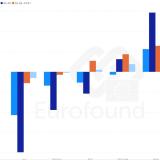
Occupazione e mercati del lavoro
L’occupazione e i mercati del lavoro sono una delle sei attività principali del programma di lavoro di Eurofound per il periodo 2021-2024. La Fondazione continuerà a fungere da centro di competenze per il monitoraggio e l’analisi degli sviluppi del mercato del lavoro, in particolare dal momento che i mercati del lavoro europei si trovano ad affrontare sfide importanti all’indomani della pandemia di COVID-19. La raccolta di dati e la ricerca si concentreranno sulle conseguenze della pandemia per il lavoro e l’occupazione e su come garantire che il mercato del lavoro continui a funzionare e a essere inclusivo.
Nel periodo 2021-2024, la ricerca di Eurofound fornirà importanti indicazioni sulle sfide e le prospettive nel settore dell’occupazione e dei mercati del lavoro nell’UE. Eurofound ha un ruolo importante da svolgere nel monitoraggio delle tendenze nel mercato del lavoro e nel monitoraggio dell’impatto di tali tendenze sulle diverse categorie di lavoratori.
La ricerca si concentrerà in generale sull’evoluzione della struttura del mercato del lavoro utilizzando gli strumenti di monitoraggio consolidati di Eurofound, l’ Osservatorio sull’occupazione in Europa (EJM) e l’ Osservatorio sulla ristrutturazione in Europa (ERM), insieme ai dati Eurostat. Poiché si prevedono elevati livelli di disoccupazione in alcuni paesi, regioni, settori e occupazioni, che interesseranno anche i lavoratori più precari e vulnerabili, questi strumenti contribuiranno a individuare settori, occupazioni e qualifiche in crescita e in declino. L’ERM continuerà inoltre a esaminare eventi di ristrutturazione su vasta scala, strumenti legislativi e di sostegno, nonché misure elaborate dalle parti sociali e dalle autorità pubbliche per assistere i lavoratori nella transizione da un posto di lavoro all’altro o da un settore all’altro.
Eurofound si concentrerà inoltre sulla carenza di manodopera e sul sottoutilizzo delle risorse umane e dei talenti in determinati settori e occupazioni, accentuati durante la pandemia di COVID-19, esaminando gli interventi strategici e le prassi istituzionali. Temi specifici comprenderanno gli squilibri tra domanda e offerta di competenze , l’ orario di lavoro , la mobilità geografica o professionale e l’ integrazione dei migranti , nonché le categorie sottorappresentate nel mercato del lavoro quali igiovani, le donne e i persone affette da disabilità . Eurofound esaminerà inoltre i settori tradizionalmente colpiti dalla carenza di manodopera, una questione che diventa sempre più urgente a causa della pandemia. Questa attività contribuirà ai lavori preparatori per la prossima edizione dell’ indagine sulle imprese europee (ECS) .
Proseguirà inoltre in questo ambito la collaborazione di Eurofound con il Centro comune di ricerca (JRC) della Commissione europea. La ricerca sulla ristrutturazione contribuirà alle attività del Fondo europeo di adeguamento alla globalizzazione (FEG) e del Fondo sociale europeo+ (FSE+). Saranno esaminati i collegamenti con l’agenzia sorella Cedefop e con l’Autorità europea del lavoro per quanto riguarda le competenze e la mobilità dei lavoratori nel contesto delle politiche occupazionali volte ad affrontare le carenze di manodopera.
- Infografica: Occupazione e mercati del lavoro nell’UE























